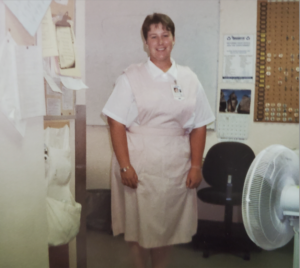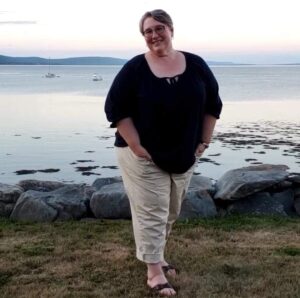By Maria Fleet
Sarah Oxner’s life is exceptionally busy. She’s a full-time optician at an optometry office in Nova Scotia, and she’s guiding her 18-year-old son through the challenges of independence as a kid on the autism spectrum. With 3 cats and an assortment of fostered kittens, she’s a self-confessed “crazy cat lady” that the local SPCA chapter depends on. And when she gets a rare chance to go out dancing with her friends, there’s no stopping her!
With that kind of energy, you might never suspect that not very long ago she avoided going up and down stairs at home to do the laundry. For most of her life, Sarah has struggled with her weight.
Growing up on a farm, Sarah was active – spending a lot of time outdoors, working in the fields, riding bikes with her brothers. She and her family ate healthy food straight from the earth– fresh produce was always available. Sarah’s childhood diet was as wholesome as it gets. “Pop, chips, chocolate bars and ice cream were very rare treats,” she says.
And yet, she was still the largest member of her family. Her mother, father, and two brothers were all slim. She was, well, bigger. Her mother confirms that she was even bigger as a baby. That was just who she was.

Sarah, in High School
“I know from looking back through all my records that my mom kept, like I’ve been overweight right since I was a baby. So, I’ve never known what it is to be a regular kind of weight,” she explains. “Of course, as a kid, until I really got into school age, [I] didn’t know there was an issue. I just thought I was me.”
As it is for many kids, school is when she came up against the realization that people saw her through a different lens: she was larger than her classmates – and somehow, it was a negative. She thought, ‘Hey, I am different than everybody else. I don’t look the same and now I’m being treated different because of it.’
She was teased and bullied. She was chosen last for team activities. It was all very bewildering… and painful.
“But I think the first time it really hit home was when I was ten,” Sarah recalls. “My parents had to take me to a major hospital… to see about having some genetic testing done that required muscle biopsies. And the first thing the doctor did was right in front of me, start complaining about my weight. And I was only ten years old!”
Thinking back about it now, she wonders why it didn’t occur to the doctor to have that conversation privately with her parents, to shield her from what felt like a criticism of how she was, even who she was.
The doctor treated Sarah’s weight as something in need of emergency intervention – insisting that they see a dietitian right away, that day, at the hospital before leaving. As Sarah tells it, the doctor’s stance was “‘you guys are going to the dietitian here at the hospital right now before you leave and we’re figuring out what you’re doing wrong with your daughter.’”
They did go to the dietitian and listed everything that Sarah ate in a typical day. The dietitian was baffled. There appeared to be nothing wrong with Sarah’s diet at all. The woman had no suggestions. Sarah remembers being left with the dietitian’s conclusion: “‘She’s just a big kid.” That was that.
There was no prescription, no advice, no plan. But there was, well, residue. “It wasn’t long after that that now the circle of dieting started in my life, because now I’m critically aware of the fact that I’m overweight,” Sarah says.
As Sarah approached puberty, she started to try different things to manage her weight. She tried SlimFast shakes, experimented with fiber pills, and checked out the grapefruit diet. Nothing worked.
She tried going to a dietitian again – but the dietitian plans left her feeling constantly hungry. She thought, ‘This can’t be what my life is meant to be… starving all the time, trying to stay active, but still just putting the weight on.’
At twelve, she remembers, she weighed about 170 pounds. “And I can remember thinking to myself, you know, if I could just stay this weight because I know I’m still growing, like, life would be good. I just need to hold on to this weight and not gain any more.” She even imagined having a magic knife that could shave off parts of her body and sculpt it into something different, something more acceptable.
Her weight was a mystery. Everyone else in her family was slim, and she was every bit as active as her brothers, yet she still carried extra weight. And she felt judged. “It was easy for people to look at me and go, ‘Oh, well, she just must be lazy and sitting and eating chips and chocolate bars all day long.’”
But there was a clue in her family background. A generation back, on her paternal grandmother’s side, some of the women had been larger. She was finally diagnosed with a metabolic disorder that caused her hormones to be wildly out of balance. “That’s when we realized, yeah, for me it was out of control hormones all my life… So, most of your typical dieting and advice was more hurtful for my situation than helpful,” Sarah explains.
Sarah’s hormonal disorder, it turned out, was causing her to carry excess weight, as well as causing liver disease and fertility issues.
By this time, she really had given up trying to shed pounds. She was kind of resigned to being in a larger body. She thought she would manage her weight in a different way: by accepting it. “I’m going to just try and love myself as I am, because nothing I’ve ever done has worked,” she resolved. “I’m obviously meant just to be a very big person. And, you know, I need to try and just get comfortable with that myself because if I can’t be comfortable with it, it’s really hard to expect other people to try and be comfortable with it as well.”
She was working on that when her liver took a turn for the worse and she landed in the hospital. A biopsy revealed that she had fatty liver disease, also known as NASH.
That put her excess weight in a whole new perspective. The news was accompanied by the realization that if something didn’t change drastically in her life, she could be facing the need for a liver transplant in the next 20 years. The sobering prospect of a severely shortened life expectancy got her attention. She had plenty to live for and she was struck with renewed determination to manage her weight.
Ironically, it was while her main family doctor was away on vacation that she got a recommendation that would really change her life. A fill-in physician treating her for a flare-up of her liver looked over her chart and suggested treating her weight with the help of a weight management specialist. Sarah didn’t even know there were such doctors, but the physician told her there happened to be one such specially trained doctor right there in Halifax.
Sarah got right on it. She had a phone consultation with Dr. Laura Reardon, whose practice in Halifax focuses on medical weight management. Sarah was overjoyed to hear something from Dr. Reardon that validated her and her lifelong struggle with extra pounds. “That was like the best phone call I ever had with a doctor …because she was the very first one to tell me, ‘Look, this is not your fault. It is a chronic disease.’”

Sarah, 2020, right before discovering Dr. Reardon…
It was a cathartic relief, an exhale decades in the making. “It just made me want to cry when I heard her saying that, because I’m like, ‘Thank you! Somebody finally gets it!’ – because I’ve nearly killed myself trying to make progress before.”
For Sarah, the difference with Dr. Reardon’s practice is that the doctor starts with trusting her patients’ own experiences. Sarah says that clinicians had sometimes doubted her own recounting of her weekly diet, insisting that she must be cheating and having snacks – hence the reason for her lack of success in losing weight. Dr. Reardon’s program puts patients at the center of their own treatment.
It required Sarah to make a year-long commitment, but in return, she got access to a team of dietitians who followed her progress closely while she tracked her diet on an app, with monthly checkups to review her progress, as well as email access to the team and Dr. Reardon if she had specific questions or found herself in a stall. Sarah stresses that “no question was a stupid question.”
Sarah was happy to have a full team on her side as she got a handle on her health. She says the practice helped her unlearn some of the misconceptions of diet culture like “getting out of the mindset that fat in particular is bad for you.” Dr. Reardon and her team had great tips for modifying Sarah’s diet if she had an event coming up, and treats that kept her accountable, while letting her splurge once in a while. She also learned not to live by the scale, she says, “because that’s really not the best measure of how you’re doing.” Dr. Reardon uses other biometric measurements that give a more complete picture of her progress. Sarah has chosen to use medication as part of the program, and the doctor listens carefully to Sarah’s input in deciding whether or not to tweak the dosage.

Sarah, 2022, finally able to try kayaking again!
For others who are interested in medically supervised weight management, Sarah doesn’t downplay the challenges, but she says once you see some results, your motivation will soar. “I’m not going to lie,” she says. “The first couple weeks of making any changes definitely are always going to be the hardest. But the longer you can do it and just try to do it as well as you can…it gets a lot easier, especially once you start seeing those results. That’s where you get the motivation.”
Through it all, Dr. Reardon has been supremely flexible, Sarah says, and as a patient she really appreciates that. “[Dr Reardon] knows there’s got to be flexibility in it because you’re really asking somebody to make these huge lifestyle changes. And, you know, ideally you want to keep them for life, especially when you know that they are working and you’re feeling so much better. So, it’s got to be something realistic that…you’re able to stay with.”
The bio measurements prove that change is happening, but the main measurement for Sarah is that she just feels better – which gives her the energy and drive to show up more in her own life. A year after completing Dr. Reardon’s program, her weight is stable. Rather than avoiding the stairs or putting off running around town to do errands, she looks forward to those activities. And she has strategies for having meals out, so she doesn’t miss out on dinners with her friends.
Sarah’s excited to keep challenging herself physically – she has the confidence to see kayaking in her future. “The first time I tried kayaking, I was still very heavy compared to my current weight. So it didn’t go exactly as planned,” she says. “I didn’t have the physical stamina to be able to do it for very long. But now I’d really like to give that a go again.
“Now that my weight isn’t holding me back I’m really starting to rediscover who I am,” Sarah says. Finding a medical weight management specialist was key, she believes. “I just finally found the right doctor who is able to unlock the mystery of my weight.”
Sarah is in our free Facebook group, Personal Health Revolution, where members receive support & motivation, while getting to interact with a group of likeminded people. If you’re interested, join here.
***
For many people, diet and exercise alone are not enough to reach a healthier weight. There are now safe and effective non-surgical medical treatments that have been proven to help people be successful over the long-run. Talk to your doctor or check out our physician locator to find a doctor near you who specializes in the medical treatment of weight. Sarah’s physician, Dr. Reardon, is listed on our physician locator.
Get a weekly text to help you stay on track with your health goals! Click here to sign up.

Sarah, 2022, not afraid to wear a form-fitting dress!
This article was sponsored by Novo Nordisk Canada. All content is created independently by My Weight – What To Know with no influence from Novo Nordisk.

